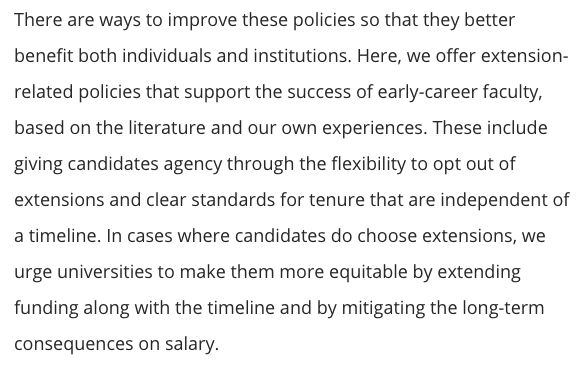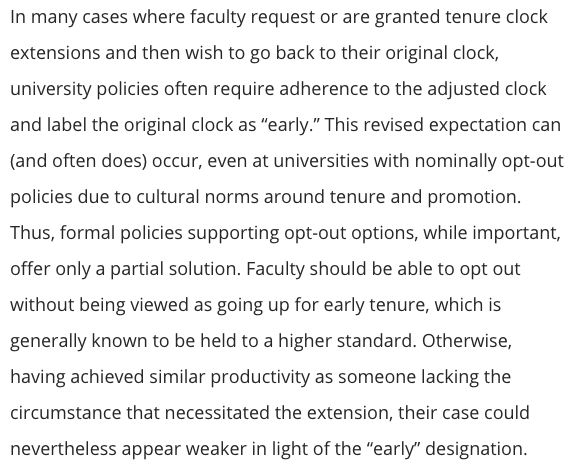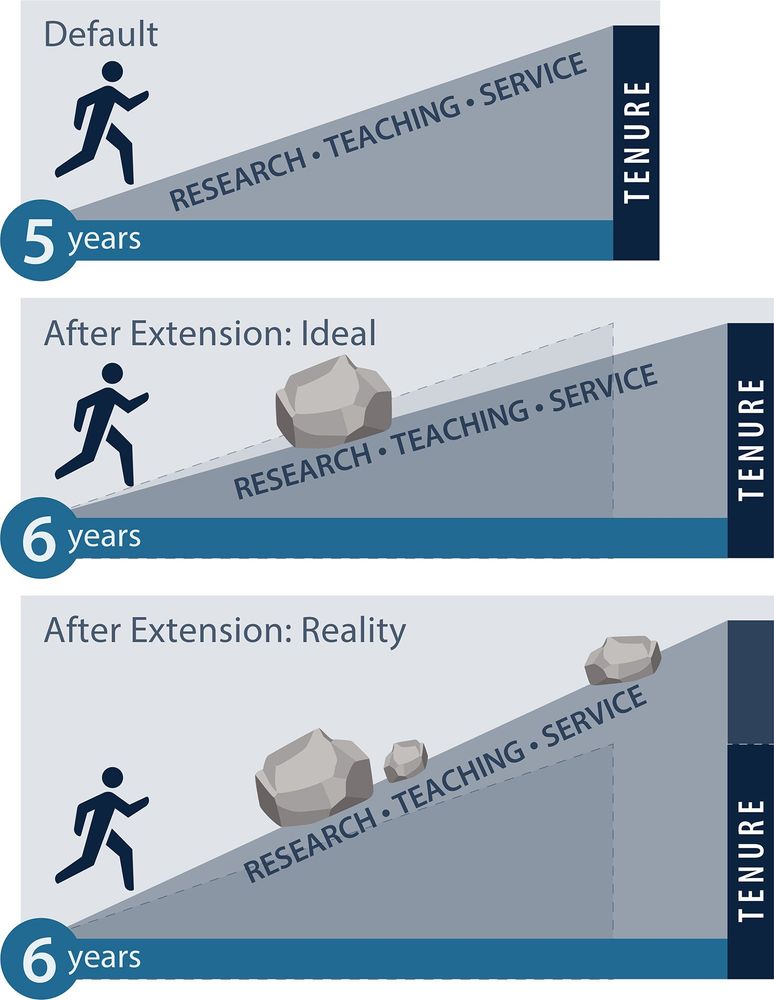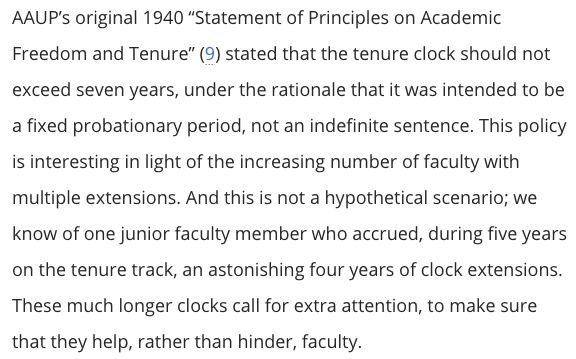And...it's here. UW announced tenure clock extension options for junior faculty last week.
Leadership frames this as part of their deep support to junior faculty. But how, exactly, is more time (& delayed promotion) are meaningful support in response to reduced & uncertain research resources?
09.06.2025 17:44 — 👍 10 🔁 7 💬 1 📌 2
Wow, I really wasn't expecting this paper to become so relevant again, so soon - but I've been hearing conversations about extending tenure clocks AGAIN. What about a four-year clock extension? 🤔 I'm sure there could be no downsides . . . .
13.03.2025 12:35 — 👍 0 🔁 0 💬 0 📌 0
MOOD
11.02.2025 16:41 — 👍 2 🔁 0 💬 0 📌 0
That's great to hear! I did talk to a few colleagues who felt they were held to clear standards like that but unfortunately it was not the majority...but it does show it's possible!
17.08.2024 00:59 — 👍 1 🔁 0 💬 0 📌 0
Thank you to all the colleagues who chatted with me privately about this over the past ~year. I'm happy to play a role in bringing this conversation into the public view! (6/6)
16.08.2024 18:45 — 👍 3 🔁 1 💬 0 📌 0

There are ways to improve these policies so that they better benefit both individuals and institutions. Here, we offer extension-related policies that support the success of early-career faculty, based on the literature and our own experiences. These include giving candidates agency through the flexibility to opt out of extensions and clear standards for tenure that are independent of a timeline. In cases where candidates do choose extensions, we urge universities to make them more equitable by extending funding along with the timeline and by mitigating the long-term consequences on salary.
We wanted to bring some light to these experiences and share some policy suggestions: (5/6)
16.08.2024 18:45 — 👍 2 🔁 1 💬 1 📌 0
My coauthors and I wrote based on the literature and our personal and shared experiences. This phenomenon is not discussed much publicly but in trusted spaces you hear the same stories over and over and over (4/6)
16.08.2024 18:44 — 👍 2 🔁 1 💬 1 📌 0

In many cases where faculty request or are granted tenure clock extensions and then wish to go back to their original clock, university policies often require adherence to the adjusted clock and label the original clock as “early.” This revised expectation can (and often does) occur, even at universities with nominally opt-out policies due to cultural norms around tenure and promotion. Thus, formal policies supporting opt-out options, while important, offer only a partial solution. Faculty should be able to opt out without being viewed as going up for early tenure, which is generally known to be held to a higher standard. Otherwise, having achieved similar productivity as someone lacking the circumstance that necessitated the extension, their case could nevertheless appear weaker in light of the “early” designation.

The tenure track illustrated as a race up a hill. The typical tenure track involves reaching the bar for tenure in 5 years, although it can be as much as 8–11 years. In the case of an extension, the intention is to allow an additional year to reach the same bar; this results in a slightly lower “slope” to account for the presence of challenges along the way. However, in reality, the bar for tenure often gets higher. Faculty have to climb a steeper slope for more time, while simultaneously having to navigate multiple obstacles.
And when faculty try to opt out of the extensions they're eligible for, they're viewed as going up "early" (3/6)
16.08.2024 18:44 — 👍 4 🔁 2 💬 1 📌 1

AAUP’s original 1940 “Statement of Principles on Academic Freedom and Tenure” (9) stated that the tenure clock should not exceed seven years, under the rationale that it was intended to be a fixed probationary period, not an indefinite sentence. This policy is interesting in light of the increasing number of faculty with multiple extensions. And this is not a hypothetical scenario; we know of one junior faculty member who accrued, during five years on the tenure track, an astonishing four years of clock extensions. These much longer clocks call for extra attention, to make sure that they help, rather than hinder, faculty.
Extensions are becoming more and more common (e.g. COVID) and they're accumulating for some faculty (2/6)
16.08.2024 18:42 — 👍 3 🔁 2 💬 1 📌 0
PNAS
Proceedings of the National Academy of Sciences (PNAS), a peer reviewed journal of the National Academy of Sciences (NAS) - an authoritative source of high-impact, original research that broadly spans...
New paper I'm extremely proud of: "Extended time, elevated expectations: The unappreciated downsides of pausing the tenure clock". We argue that extensions should be treated as a safety net, not insurance policy (1/6) www.pnas.org/doi/full/10....
16.08.2024 18:41 — 👍 20 🔁 14 💬 2 📌 4
A two-proof day. First Springer removed all the italics from in vivo/ex vivo/in silico, then OUP replaced all my spelled-out numbers with digits (e.g. "2 local peaks" and "8 species"). You see, academic publishing costs so much because of the aDdEd VaLuE 🙄
02.01.2024 18:35 — 👍 1 🔁 0 💬 0 📌 0

histogram showing that all 10 students scored between 0 and 95 points.
I love Gradescope in general, but their data visualization is COMICALLY bad.
18.10.2023 22:41 — 👍 1 🔁 0 💬 0 📌 0
Behind every seemingly sane early stage professor, there is a slack of other ESIs shitposting through it with her...you know who you are.
26.09.2023 16:03 — 👍 20 🔁 2 💬 0 📌 0
why would researchgate name itself after an academic scandal that hasn't happened quite yet
22.08.2023 16:21 — 👍 87 🔁 24 💬 2 📌 1
When Hiroshi and I first talked, he described us as "climbing the same mountain from different sides". I'm very much looking forward to seeing what we find at the top!
05.09.2023 19:31 — 👍 0 🔁 0 💬 0 📌 0
We submitted our proposal to NSF (and a similar version, in Japanese (!!) to an agency in Japan), but it was picked up for funding by NINDS. I'm very grateful for their support as well as the Japanese NICT. I'm also happy to talk about my experience with CRCNS!
05.09.2023 19:31 — 👍 0 🔁 0 💬 1 📌 0
CRCNS (Collaborative Research in Computational Neuroscience) is a weird program that definitely had some administrative/logistic challenges - but it is so cool that a mechanism exists to fund international collaborations like this.
05.09.2023 19:31 — 👍 0 🔁 0 💬 1 📌 0
Ever since I met one of Prof. Kawasaki's students at SfN in 2019, which I attended to find experimental collaborators, I knew that we could do cool things together. First, we published an awesome paper in PLOS Comp. Bio, and then I found the funding mechanism to let us keep working together!
05.09.2023 19:31 — 👍 0 🔁 0 💬 1 📌 0
Just awarded my first R01! With our collaborator Hiroshi Kawasaki, we're going to investigate the role of astrocytes in cortical folding via a combined computational and experimental approach!
05.09.2023 19:29 — 👍 5 🔁 0 💬 1 📌 0
A wise man once said “every plan is a tiny prayer to Father Time”. (B. Gibbard, 2005)
But these days w/little kids it’s more like “every plan is a tiny prayer to our immune systems” and let me tell you they are an uncaring lot.
25.08.2023 14:16 — 👍 4 🔁 1 💬 1 📌 0
Designing cameras of the future!
Portland State University
Computational Imaging Lab https://computational.camera/
Software engineer. Imagineer at Disney Streaming. ITBA CS alum.
Scientist. Mom. Coffee snob. Protein nerd.
Immunoengineer studying lymphatics and lymph nodes, amateur biker, baker, and gardener; views = own
How do cells work together and make decisions when people have so much trouble? Group Leader @HHMIJanelia She/They 🏳️🌈
Assistant Professor, studies host-microbe interactions and women's health. Views are my own.
Microbiologist 🧫🧪 | Microbe-Microbe interactions in infection | Mom of 👧🏼👦🏼🐶| Asst. Professor at UTK | Views my own
Founder & CEO @jura.bsky.social | Full-stack probabilistic machine learning for the development of genetic medicines | NYC & Basel & Boston
I study how bacteria kill plants. Interested across biological scales: molecular 🧬, cellular🦠, organismal 🧫, ecological 🥀🌍, and evolutionary 🧬.
Optimistic pessimist: The world is dark, so how can we slow the decline?
ampersand enthusiast.
also Asst Prof & #newPI at UMass Lowell | chromosomes, C. elegans, STEMed+equity | via FIRST IRACDA @ Emory, MCB @ Berkeley, Carolina, & NCSSM | leewormlab.weebly.com
Assistant Professor University of Pittsburgh, Cancer Bioengineering, www.zervalab.com
microbiologist studying bacterial-phage interactions. mom of two. Assistant prof @WUSM_MolMicro. http://leroux-lab.org. #newPI. Views are my own.
Assistant Prof @ Yale MCDB; RNA enthusiast; washed up college athlete; kid wrangler x2 (not necessarily in that order)
Primarily-Teaching + Research Mentor @ Quinnipiac University in CT. Microbial Pathogenesis, Cell Bio, rickettsia. All posts and conversations here are my own.
The official Bluesky account of the University of Notre Dame ☘️
The premier Catholic research university in the U.S. and a force for good since 1842
Webcomic covering parts of science, peer review, data, academic careers, and puns. #science #scicomm #sciart
Comic/cartoon art shared under CC-BY-NC-SA
Get my newsletter at http://redpenblackpen.substack.com
Evolutionary biomechanist. Awesome animals, dinosaurs, anatomy, locomotion, computer modeling, http://whatsinjohnsfreezer.com, #DisabledInSTEM. #DAWNDINOS. He/him. Fellow of the Royal Society.
Inter-dimensional cancer biologist. Director of the @genomescience.bsky.social at @umbaltimore.bsky.social.
Cancer biologist. Once an academic PI, now Senior Director of Scientific Engagement in single-cell biotech. Posts/views/cats mine.
she/her. Full Prof, AD Educ & Training @LombardiCancer. #lobular, HER2+/ER+ BrCa, #nuclearreceptors, #GBM. Co-founder @nrimpact.bsky.social. When not sciencing, I'm enjoying ⛵️⛺️🏋🏻♀️🏃🏻♀️🥃 Skeets my own





